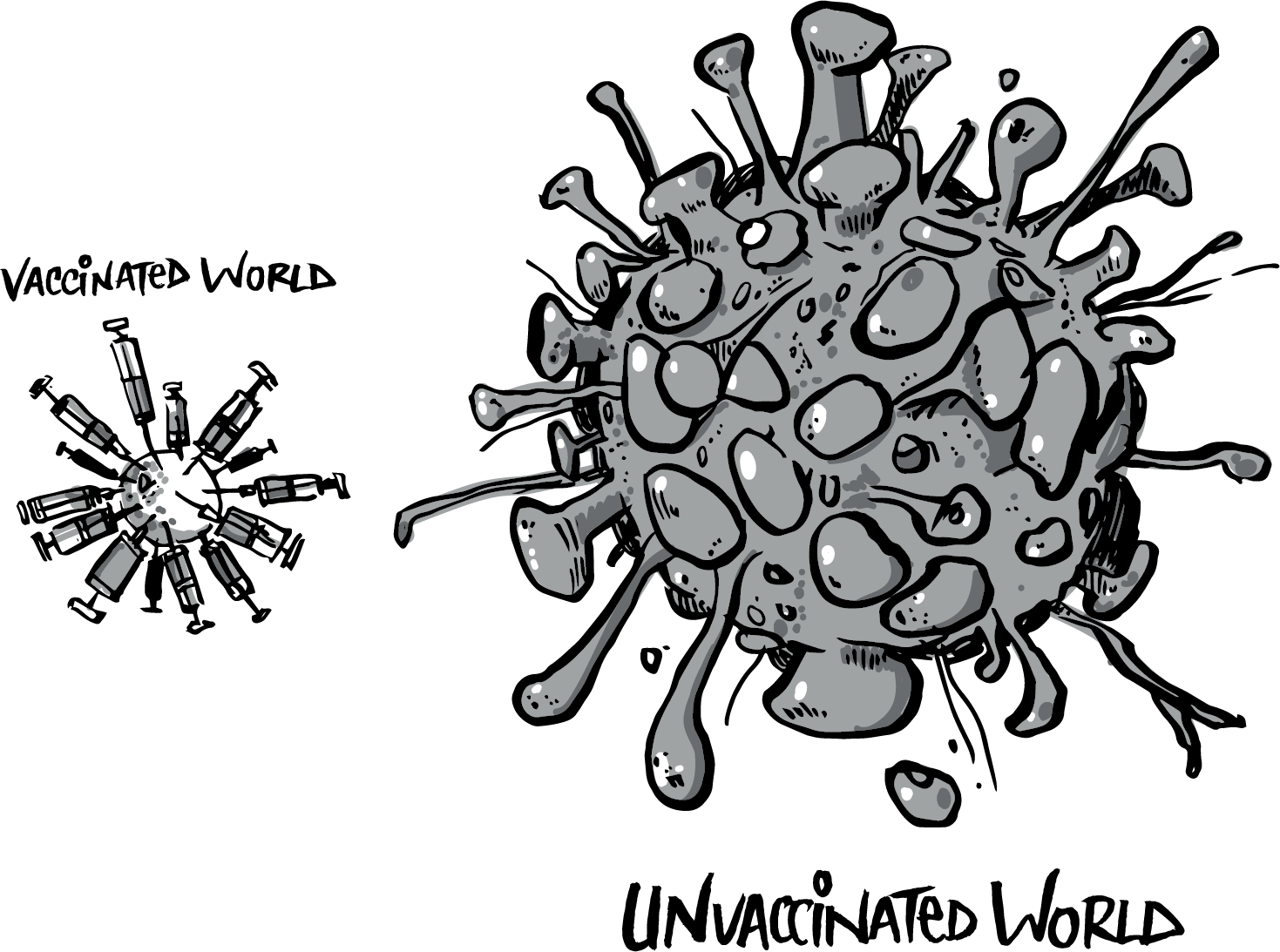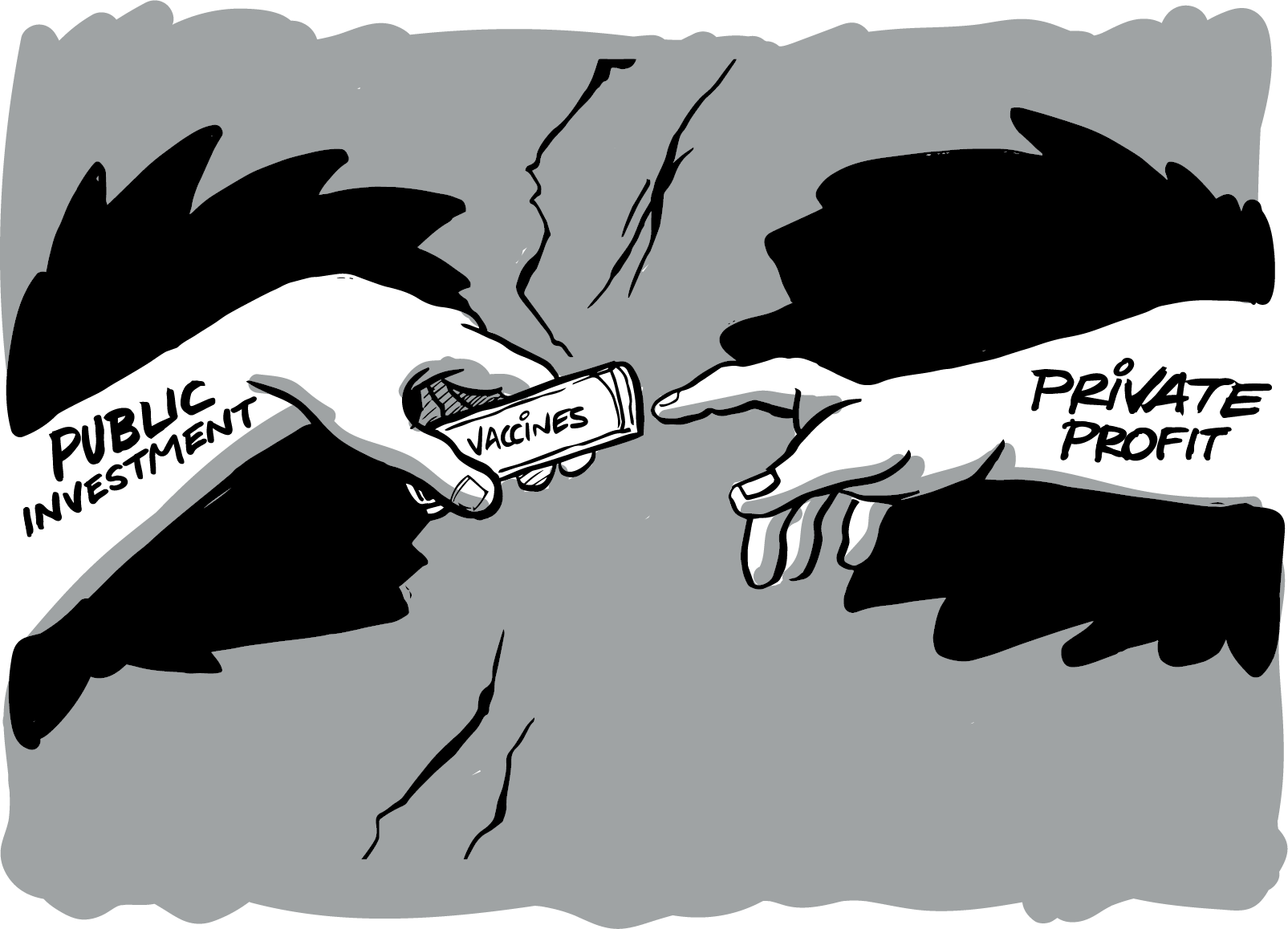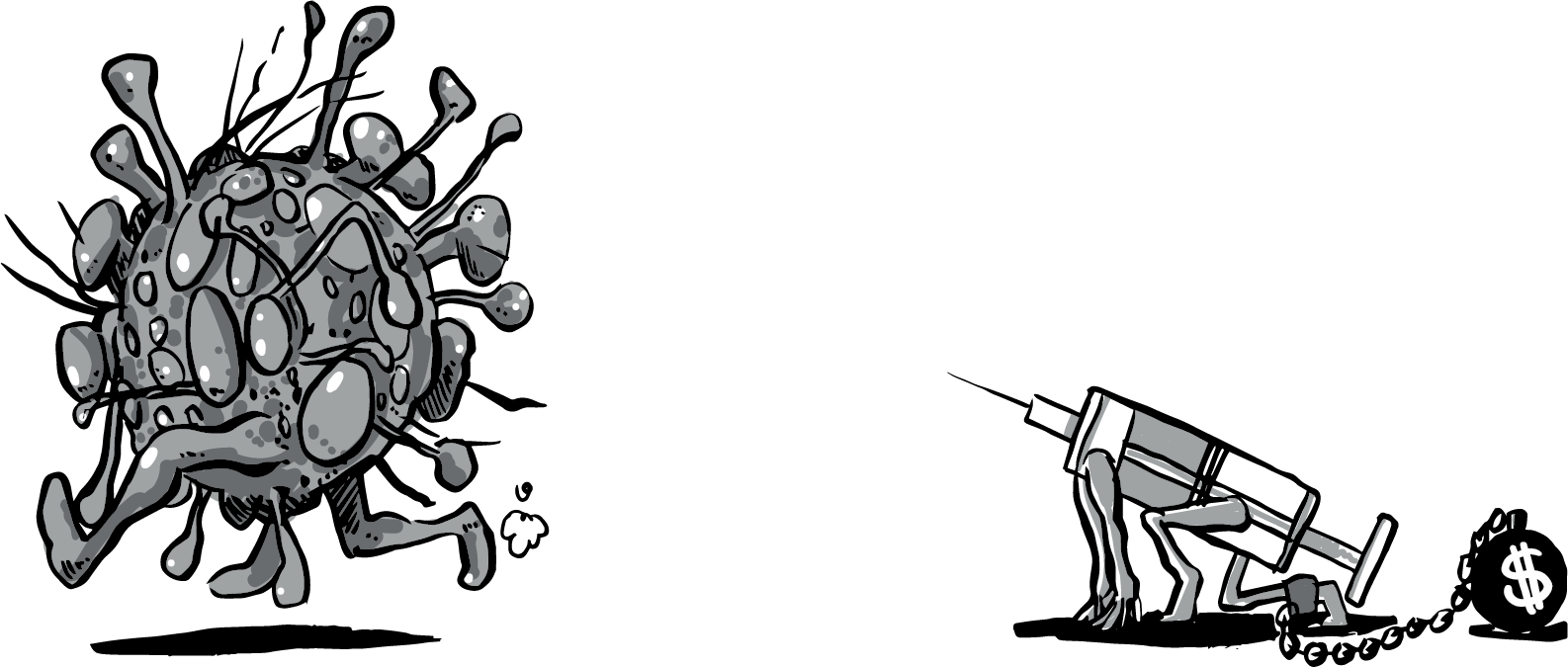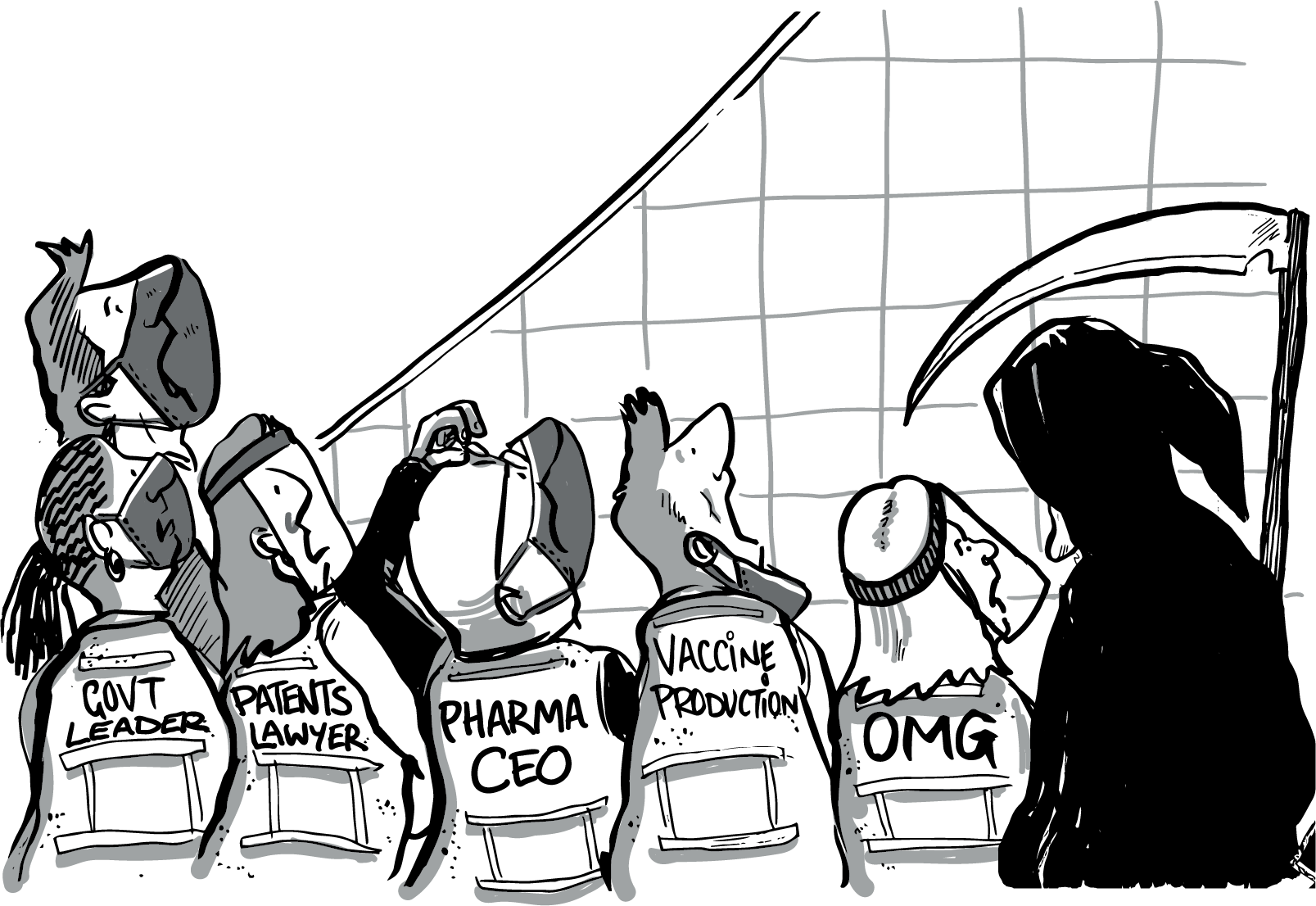MYTH #1: We’re all getting the COVID vaccine…
No. Not all of us. Many developing countries don’t have any supply at all yet. Nothing. At best, many will only be able to vaccinate one person in 10 this year. Unless something changes, vaccinating everyone across the entire world will take years. But if you’re lucky enough to live in a rich developed country then you’ve either already had a jab or are very likely to get one soon. Rich countries are vaccinating at a rate of one person-per-second—which is fantastic!—but for most people in the world the future is an uncertain and unprotected one.
MYTH #2: … and we’re beating the pandemic.

Well, there’s hope if you live in a rich country, sure. But poor countries all over the globe just don’t have enough vaccines. They don’t have enough oxygen or medical supplies either. We’re simply not making enough vaccines because big pharmaceutical corporations have a monopoly on them and rich countries cornered the vaccine market long ago. As a result, vaccine inequality is going to make COVID both more deadly and more costly. Vaccine inequality could cost the world as much as $9 trillion. And then there’s mutations: the longer we let the virus spread, the more it will evolve and today’s vaccines won’t work, sooner than we think. Which means we’re not beating COVID until we beat it everywhere.
MYTH #3 The UN is getting enough vaccines to poor countries.
It’s trying to—but the UN alone can’t do it. The World Health Organisation’s “COVAX” facility aims to get 20% of people living in poor countries vaccinated by 2021. This is welcome—but would you be happy if only one person in five was vaccinated in your neighbourhood? There’s another UN initiative called the “COVID Technology Access Pool” (C-TAP) where Big Pharma corporations were invited to volunteer their vaccine technology and know-how so that more producers around the world could make them. This is a super-important initiative. But not one Big Pharma corporation has signed up so far—zero! Meanwhile, some rich countries say they’ll donate some of their surplus vaccines to poor countries which is helpful too, but we’re not going to vaccinate everyone by donation.
MYTH #4: ‘Intellectual property’ isn’t the problem here…
It really is a big part of it. Everything needed to make the vaccine—the know-how and technology—is held under the lock-and-key of the pharmaceutical corporations’ “intellectual property”. And there is a huge fight over it: 101 developing countries led by South Africa and India are calling for World Trade Organisation members to waive intellectual property rights over the COVID vaccines and a powerful minority of rich nations led by the US, UK, EU and Japan are fiercely opposing them (although the Biden Administration is said to be reconsidering its position—which is encouraging news). Intellectual property goes to the heart of vaccine inequality. In the 1980s Big Pharma led an idea (that inventors be given sole control in order to profit from their “intellectual property”) that became one of the key rules governing global trade today. They argued for these deliberate monopolies as the best way to guarantee innovation and maximise the benefits for humanity. It also happened to be heavily in their own financial interests. Today this approach is actually locking away the benefits of publicly funded science for billions of people on the planet.
MYTH #5: …. it just allows Big Pharma to protect its discoveries…

No—the discovery and production of these vaccines was funded by more than $100 billion in tax-payers’ money. Vaccines have effectively been privatised and handed over to big Pharma. So the likes of Pfizer and BioNTech, Moderna, AstraZeneca, Novavax and Johnson & Johnson have significant control over all the technology, know-how and science—and along with that, all the decisions about how many vaccines get made, their cost, and who gets it and when. They’re protecting huge revenue: Pfizer’s vaccine will be one of its best-sellers at around $15 billion in revenue this year alone. It has sold almost all its doses to rich nations and isn’t interested in producing them outside the US and Europe for years.
MYTH #6: … and it gives them an incentive to keep discovering.

This excuse is designed to really play upon our worst fears (“they won’t help us in the next pandemic if they don’t make billions out of this one“). It doesn’t hold water. Governments will always incentivize private corporations to help protect public health (remember that $100bn of public money that sparked today’s COVID vaccines?). Nor is anyone suggesting the Big Pharma corporations do it for free. There are times, certainly, when respecting private property can drive greater efficiency and productivity. But these rights aren’t sacrosanct. Sometimes they simply don’t guarantee the best social or economic outcome. This is one of those times where to do so is causing greater inequality and will lead to many more deaths and economic ruin.
MYTH #7: The real problem is the lack of manufacturing capacity.
Nope. Right now, there is more manufacturing capacity all around the world that isn’t being used, and is could be. There are vaccine producers from Bangladesh to Denmark saying they’re ready to go. You might expect, during a deadly pandemic, that once a vaccine was discovered factories everywhere would swing into action. Not so. In large part because Big Pharma corporations—backed by rich countries—are not willing to share their technology and know-how. If they did, we’d see generic competition being able to produce more global supply at lower prices.
MYTH #8: We can’t risk sub-standard vaccines coming onto market.
Really!? Pharmaceutical manufacturers over the world are already making hundreds of thousands of medicines and vaccines that we all use and have done for years. They are qualified and capable of making a COVID vaccine in accordance with strict WHO quality standards—if only they were allowed. AstraZeneca itself has licensed production to companies around the world, including in India and in Argentina, so it is already comfortable that its vaccine can be produced in countries that are able to test, control and regulate quality standards. Suggesting they can’t ‘keep up standards’ smacks of arrogance and excuse. It is a long-used tactic of the most powerful pharmaceutical corporations to protect their profits. Protecting standards is vital and can be achieved
MYTH #9: There are legal ways around intellectual property.
Yes—in theory, for public health emergencies like this—but rich countries make these exceptions nearly impossible for others to use. For example, “compulsory licenses” should allow countries to access certain technologies. But to make a COVID vaccine, there are hundreds of different things for which they would have to obtain a license. For many countries, compulsory licenses are like being offered a toothpick to break down the steel fence of Big Pharma’s intellectual property control.
MTYH #10: Anyway… there’s nothing you can do about it.

OMG … but you can! Join the People’s Vaccine campaign. Support the majority of people who believe that vaccine monopolies are at odds with our universal right to health. The only way these big pharmaceutical corporations and rich governments will move is by being shamed into it. As they have been before. In the 2000s Oxfam joined a global campaign that pressured many of these same corporations from their shameless monopoly profiteering from HIV/AIDS drugs.
This post was originally published on Radio Free.